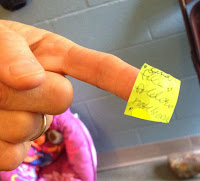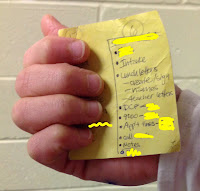So, I have this staff member at my school in a new position who still has a lot to learn about todo lists. I was checking in with her during the in-service before school, asking if she needed anything. She pulled this little piece of a sticky note out and showed me. I was amazed that she only had two things to remember to do, but I remembered that she was new and the students hadn't arrived yet. Then it hit me, here was a staff member using **scraps of sticky notes** to keep track of tasks. Aargh!
How could this be? This would have to be the least efficient task management system in the history of todo lists!
Once my heart rate returned to normal, I took a deep breath. Here I was, the digital principal, mister productivity himself staring at a one-inch square piece of sticky note of a todo list. I calmly suggested that my colleague think about a more efficient system. Did she want me to help her come up something? She told me that she would take care of it, that she was still figuring things out. Ok. I moved on to talk of the coming year.
A few days later, once school was in session, I was in the hall talking with the staff member. I asked how she was doing? Could I help her at all? She pulled out her hand from her pocket and showed me an index card with her new todo list. Well, her list had grown from two items to about fourteen. That seemed reasonable for the second week of school.
Hold on a minute, this was just that same as the sticky note only enlarged. Holy moly! Again, I nearly fainted. I asked if she was keeping up with everything. Sheepishly, she said something about having a little trouble remembering everything she had to do. Really! Again, I offered help getting organized. She said yes this time.
I wish that could tell you about how this staff member has become a digital pioneer and a productivity trailblazer using Evernote and an Apple Watch or Google glass and a chip embedded in her brain.
It turns out that this staff member wasn't interested in any high tech task management. She settled on a good old fashioned notebook and pen system. Now, whereever she goes, so goes the notebook. What she writes down, she remembers to take care of. Nearly four months later, it still works. And that, after all, is what matters most in a todo list.
What do you use for managing your tasks? Digital or analog list maker? What works for you?
Monday, December 29, 2014
Thursday, December 18, 2014
The students win when it is RC v. PBIS
As part of a class I am currently taking, I was asked to read and respond to an article (https://www.responsiveclassroom.org/sites/default/files/pdf_files/RC_PBIS_white_paper.pdf) that discussed how Responsive Classroom (RC) works with Positive Behavior Intervention Supports (PBIS). This assignment was perfect for me as both approaches are in heavy use at my school.
Instead of writing something new about the relationship between RC and PBIS, I figured I would just publish my assignment.PBIS and the Responsive Classroom Approach article: Reflective Question
Both PBIS and Responsive Classroom fit well with my philosophy of education (my complete statement can be found here: http://principalspov.blogspot.com/p/philosophy-of-education.html). Essentially, PBIS, RC, and I all agree that it is up to the teacher to change the environment to support student success. We all agree that positive approaches work and "that punitive or ‘get tough’ strategies can be counterproductive and are harmful to children." Over time, my philosophy of education has shifted to include student behavior into the belief that all children can learn and be successful.
The complementary approaches of PBIS and RC are focused on supporting all children to find success. The article explains that using RC can help with a successful PBIS implementation. While RC does not provide meaningful systems for intensive behaviors, it does provide the foundation for the Universal Tier of PBIS. Classroom environment, rule creation, teaching and reteaching procedures and behaviors, and positive adult language all work together to set the stage for students to be successful. RC fills in some of the ‘how’ in the PBIS system.
These two systems are in-sync with one another. Staff who are fully trained in RC (as many Wolcott staff have been when at JSC) are primed for work in a PBIS system. The small differences (language v. material reinforcement, universal v. leveled tiers) are surmountable when some flexibility and creativity are applied. Those staff who truly adhere to either can usually adapt to use the other. The challenge is not whether RC and PBIS fit together. The challenge is helping staff evolve their thinking from punitive to positive, from reactive to preventive. Together, RC and PBIS support my philosophy that all children can learn and succeed.
Labels:
PBIS,
principalship,
RC,
students,
Wolcott
Saturday, December 6, 2014
The Three Questions
No, this is not a discount Passover story (ask a Jewish person about the FOUR Questions). This post is about the Three Questions that I asked staff at the very first faculty meeting of the year.
I've been collecting feedback in a variety of ways from the staff since I began as an administrator. Last year, I happened upon a set of questions that many families use during weekly family meetings (my family started this process at the same time). I decided that these questions can work very well for the school family. So, in August, I asked every staff member to write answers to these three questions:
The answers were very instructive. Some answers will seem obvious to anyone who has ever worked in a public school. Others are quite particular to Wolcott Elementary. Still other answers are actually highly personal.
Right away I noticed that the responses are filled with contradictions. For example, there were four comments about how staff interactions went well last year and seven comments about how we need to improve staff community. Six comments about improved behavior/PBIS last year and eight saying we need to improve those areas.
I was particularly pleased that one of the main areas indicated as needing improvement (behavior/PBIS), was an area that we spent a lot of time on over the summer. I spent four days with a team of staff in July and another day in August preparing a whole set of changes to our behavior and celebration systems.
And, of course, there are the perennial areas such as communication. Please see my previous post for ways that I am working on improving communication for staff.
And now for the responses themselves:
I left out the personal commitment answers from question three because many were too easy to identify the author.
Within each question, I loosely grouped responses together. Blanks equal personally identifying information.
What Went Well Last Year?
What We Can Improve?
I conducted a follow-up staff survey in early November and got lots of good feedback about the new behavior/PBIS initiatives. There were also a few comments about how good the climate was among staff. I will return to this sort of practice again and again as we continue our work.
How is your year going? What needs to improve? What will you commit to improving in your practice? Please leave comments below.
Cross posted to Connected Principals.
I've been collecting feedback in a variety of ways from the staff since I began as an administrator. Last year, I happened upon a set of questions that many families use during weekly family meetings (my family started this process at the same time). I decided that these questions can work very well for the school family. So, in August, I asked every staff member to write answers to these three questions:
- What things went well in our school last year?
- What things could we improve in our school?
- What things will you commit to working on this year?
The answers were very instructive. Some answers will seem obvious to anyone who has ever worked in a public school. Others are quite particular to Wolcott Elementary. Still other answers are actually highly personal.
Right away I noticed that the responses are filled with contradictions. For example, there were four comments about how staff interactions went well last year and seven comments about how we need to improve staff community. Six comments about improved behavior/PBIS last year and eight saying we need to improve those areas.
I was particularly pleased that one of the main areas indicated as needing improvement (behavior/PBIS), was an area that we spent a lot of time on over the summer. I spent four days with a team of staff in July and another day in August preparing a whole set of changes to our behavior and celebration systems.
And, of course, there are the perennial areas such as communication. Please see my previous post for ways that I am working on improving communication for staff.
And now for the responses themselves:
I left out the personal commitment answers from question three because many were too easy to identify the author.
Within each question, I loosely grouped responses together. Blanks equal personally identifying information.
What Went Well Last Year?
- Celebrating children
- Children seemed happy and valued
- School spirit
- PBIS
- Having _____ available for behavior interventions and guidance
- Extreme behavior challenges seemed to be under better control with use of interventionists and _____
- Last year I was with an amazing teacher that taught me so much
- Collaboration among faculty and staff went well last year
- Working with the people I get to work with
- People seemed to get along better children and adults
- We designed some changes that will bring us to the next stage
- Decisions to change thing up and head out on a path to improvement
- LLI now in k - 3
- Math interventions and planning
- Music
- Art collaboration with classroom teachers
- Spring/ winter concerts with Kristin’s leadership and talent
- Art integration / art shows and music performances
- 1st grade parent involvement and k - 2 evening events
- ASP! More tech integrations
- I didn’t hurt myself!!!
What We Can Improve?
- PBIS / expectations and procedures
- RC and PBIS
- PBIS
- Consistent discipline
- Behavior / school climate
- Consistency in student behaviors/ expectations
- Authentic celebrations of success [academic, behaviorally, social]
- Our focus on academic excellence celebrating academic achievement
- Community building between faculty and students
- Our community feeling among staff [more parties, get togethers, camaraderie]
- We need to find new ways to respect each other
- We need to improve on gossip among staff
- Negative energy
- To make all staff [not just faculty] feel equal
- Kindness
- Communication with all staff
- Communication
- Communication
- We could improve our communication with each other
- Communication between coworkers is something that could improve
- Better communications
- Lunch choices
- Becoming more organized
- Noise control from hallways/ classrooms that student’s complain about as distracting
- More planning time
- Quieter ______ classes for more focused work
- Curriculum - vertical align, dynamic inst., celebration
I conducted a follow-up staff survey in early November and got lots of good feedback about the new behavior/PBIS initiatives. There were also a few comments about how good the climate was among staff. I will return to this sort of practice again and again as we continue our work.
How is your year going? What needs to improve? What will you commit to improving in your practice? Please leave comments below.
Cross posted to Connected Principals.
Labels:
communication,
teacher,
Wolcott
Subscribe to:
Posts (Atom)




